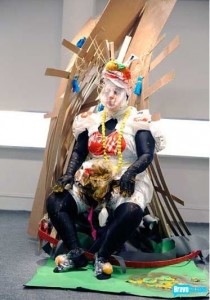By Bob Hicks
Mr. Scatter doesn’t watch much television (especially since the Mariners have taken a dive into baseball’s primordial ooze of futility: where are you now, Edgar and Buhner and Big Unit?), and he doesn’t really go in for the American Idol model of determining cultural “winners.”
 Shows like Idol and So You Think You Can Dance certainly reflect the effect of the marketplace on the art world — an effect that a lot of people like to pretend doesn’t exist but is in fact crucial. That doesn’t necessarily make it a positive, only an inescapable fact of life. Still, as we’ve all become excruciatingly aware, an unchecked marketplace can be an arena for disaster, and Mr. Scatter is not convinced that his musical listening habits, for instance, should be determined by a popular vote.
Shows like Idol and So You Think You Can Dance certainly reflect the effect of the marketplace on the art world — an effect that a lot of people like to pretend doesn’t exist but is in fact crucial. That doesn’t necessarily make it a positive, only an inescapable fact of life. Still, as we’ve all become excruciatingly aware, an unchecked marketplace can be an arena for disaster, and Mr. Scatter is not convinced that his musical listening habits, for instance, should be determined by a popular vote.
This is a long route to confessing that he hasn’t actually watched an episode of the Bravo network’s Work of Art, in which visual artists advance or fall by the wayside according to a Trump-like theory of failure and success. Fortunately Regina Hackett, from her perch at the provocative and insightful Another Bouncing Ball, has watched, and thought, and written.
Her post Reality TV: artists as female stereotypes is a good read, and typically for ABB, it rattles the cages of conventional wisdom. And Hackett can be funny. Musing on Work of Art‘s judges, whom she judges to be pretty lame, she wonders whether the show couldn’t be goosed up a bit if venerated critic Donald Kuspit joined the panel: “When being fed nonsense, I prefer it to be elegant nonsense, like Kuspit’s.”
*
Hackett’s post here on Dave Hickey (she calls him “the great tap-dancing art critic of our time”) is also a refreshing read. Here’s Hickey on university life: “It took me a few years to realize you can’t talk to other English teachers about literature. You can talk to them about their pets, though. That’s why you want to learn all the names of the professors’ pets, so when you see them in the hall you can ask, ‘How’s Roscoe?’ and they will go on for half an hour, and you can nod along and think about whatever you want.”
*
Meanwhile, Barry Johnson at Arts Dispatch and David Stabler at The Oregonian have been having an interesting conversation about whether it’s smart or dumb for arts groups to slash budgets in tough times. Should you cut budgets and programming, because it’s prudent to balance your budget? Or does that simply make you look desperate? The ping-pong has been interesting, and so have the comments by a lot of smart onlookers.
I like the latest (so far) take on the fray, by Oregon Symphony violist Charles Noble at Noble Viola: “What you cut is almost as important as how much you cut. … For example, cutting all pops programming because ‘the audience is all dying anyway’ is catastrophic cutting, whereas searching for the audience that we most want to develop and then catering to them within the general pops genre is the better route, though possibly more expensive and time consuming. The difference is what you or I might do to our prized Japanese maple tree if we just randomly hack off stray limbs instead of hiring a skilled arborist to perform careful pruning to make the tree more healthy.”
In other words: Constantly reassess, in good times and bad. And spend smart.
This is a discussion that might actually have an impact. If you haven’t already, catch up on the conversation at these links and throw in your own two Euros’ worth.
*
Illustration: Nao Bustamante’s performance piece wasn’t shocking enough for the judges on Bravo’s “Work of Art.”

 John died on Friday, July 24, 2010, taking his familiar motorized wheelchair off of Portland’s streets and silencing his singular voice. He seemed to us a necessary antidote to Portland smugness (we ARE the center of the universe, are we not?), and his presence among us ironically added to our notion of self-worth: John Callahan is one of us! Rest in peace, John, if peace, finally, is what you wish for. Or keep fighting the metaphysical good fight.
John died on Friday, July 24, 2010, taking his familiar motorized wheelchair off of Portland’s streets and silencing his singular voice. He seemed to us a necessary antidote to Portland smugness (we ARE the center of the universe, are we not?), and his presence among us ironically added to our notion of self-worth: John Callahan is one of us! Rest in peace, John, if peace, finally, is what you wish for. Or keep fighting the metaphysical good fight.

 At his perch on the news desk, Charlie was known to lightly mock certain passages of flowery writing as he slashed through copy with his big black pencil. Sometimes he’d sigh or giggle and choose to overlook a phrase that not so privately drove him crazy: He knew which writers had permission to roam and which did not. But that didn’t stop him from pulling out his inkpad and his favorite stamp and branding the hard copy with his own gleeful judgment. The type was in a florid, immediately post-Gutenberg, barely readable old gothic. “WRETCHED EXCESS,” it said.
At his perch on the news desk, Charlie was known to lightly mock certain passages of flowery writing as he slashed through copy with his big black pencil. Sometimes he’d sigh or giggle and choose to overlook a phrase that not so privately drove him crazy: He knew which writers had permission to roam and which did not. But that didn’t stop him from pulling out his inkpad and his favorite stamp and branding the hard copy with his own gleeful judgment. The type was in a florid, immediately post-Gutenberg, barely readable old gothic. “WRETCHED EXCESS,” it said. Boffo. There it is. He loves that word. It makes him feel so, so … Variety-ish. As in, “Sticks Nix Hick Pix” (improved to the more rat-a-tat “Stix Nix Hix Pix” in the 1942 movie musical
Boffo. There it is. He loves that word. It makes him feel so, so … Variety-ish. As in, “Sticks Nix Hick Pix” (improved to the more rat-a-tat “Stix Nix Hix Pix” in the 1942 movie musical 
 For one thing, it was obvious how the accident had occurred. For another, the woman who had unknowingly swiped against the beaded kewpie doll, which was perched in a high-traffic zone in
For one thing, it was obvious how the accident had occurred. For another, the woman who had unknowingly swiped against the beaded kewpie doll, which was perched in a high-traffic zone in  Mr. Scatter got back to Puddletown just in time to take in Sunday night’s final performance of
Mr. Scatter got back to Puddletown just in time to take in Sunday night’s final performance of  The guard at the
The guard at the 